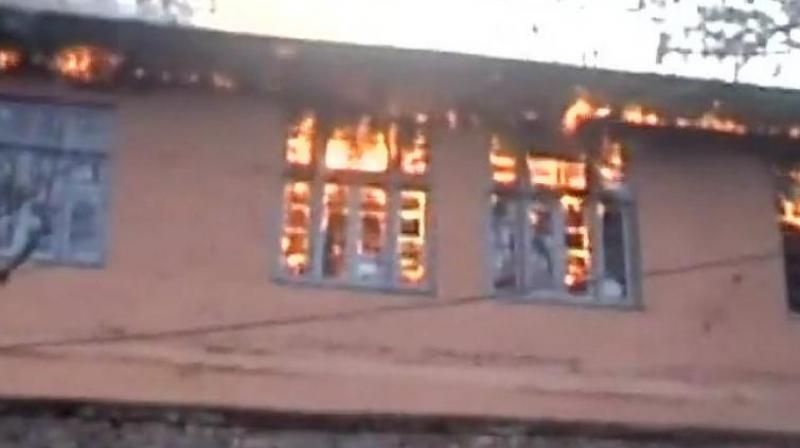J&K schools burnt, but who's in charge?
In recent weeks nearly 25 school buildings across the Valley have been sought to be literally burned down.

It has been evident for some time that the PDP-BJP coalition government in Jammu and Kashmir has, for all practical purposes, ceased to exist. Shops open and shut depending on what the separatist Hurriyat leaders dictate. Education is a conspicuous casualty as stone-throwing crowds comprised students in a big way. Attendance in government offices suffered badly. With the government shifting to Jammu for the winter, this factor may be taken care of. But what is perplexing is that the government finds itself unable to offer physical protection even to the standing social infrastructure, most notably schools, with all the security forces that have been placed on the ground, in addition to the state police. In recent weeks nearly 25 school buildings across the Valley have been sought to be literally burned down.
Three schools were set on fire in the past few days in North and South Kashmir. About 12 lakh students were enrolled in these institutions. The inability of the state administration to conduct Class 10 and Class 12 examinations is already a matter of anxiety to the entire Kashmir Valley, except of course to the Hurriyat leadership. The octogenarian pro-Pakistan leader Syed Ali Shah Geelani, who has emerged as the command centre of the destructive aspect of separatist politics, recently told a civil society delegation to J&K led by former Union minister Yashwant Sinha that this was just as well. He thinks that students are in no frame of mind to take exams as they have seen their friends and relatives die in the course of the recent agitation or being interned under the Public Safety Act. Ironically, he didn’t try to stop his own grand-daughter from sitting for her exams, newspapers reported. This hypocrisy is a subject of comment in the Valley.
Evidently, the separatists are pleased that the normal rhythm of life is comatose and appear entirely satisfied that school buildings are being gutted by miscreants with a political agenda. Former chief minister and National Conference leader Omar Abdullah pointedly noted this on Sunday. But Chief Minister Mehbooba Mufti and the state’s BJP leadership have been conspicuous by their silence on this grave matter, which is reminiscent of the disturbances of 1989-1990. In that period of insurgency in Kashmir, pro-Pakistan elements had chosen to target state buildings, bridges, culverts, small dams, and educational institutions, besides police stations, and they could do so with impunity. The question does arise if we are back to a somewhat similar stage. It is not clear who should be answering questions about security in Kashmir — the state government or the Centre? Perhaps it is time the governor invited all political parties in the state for a broad consultation.

